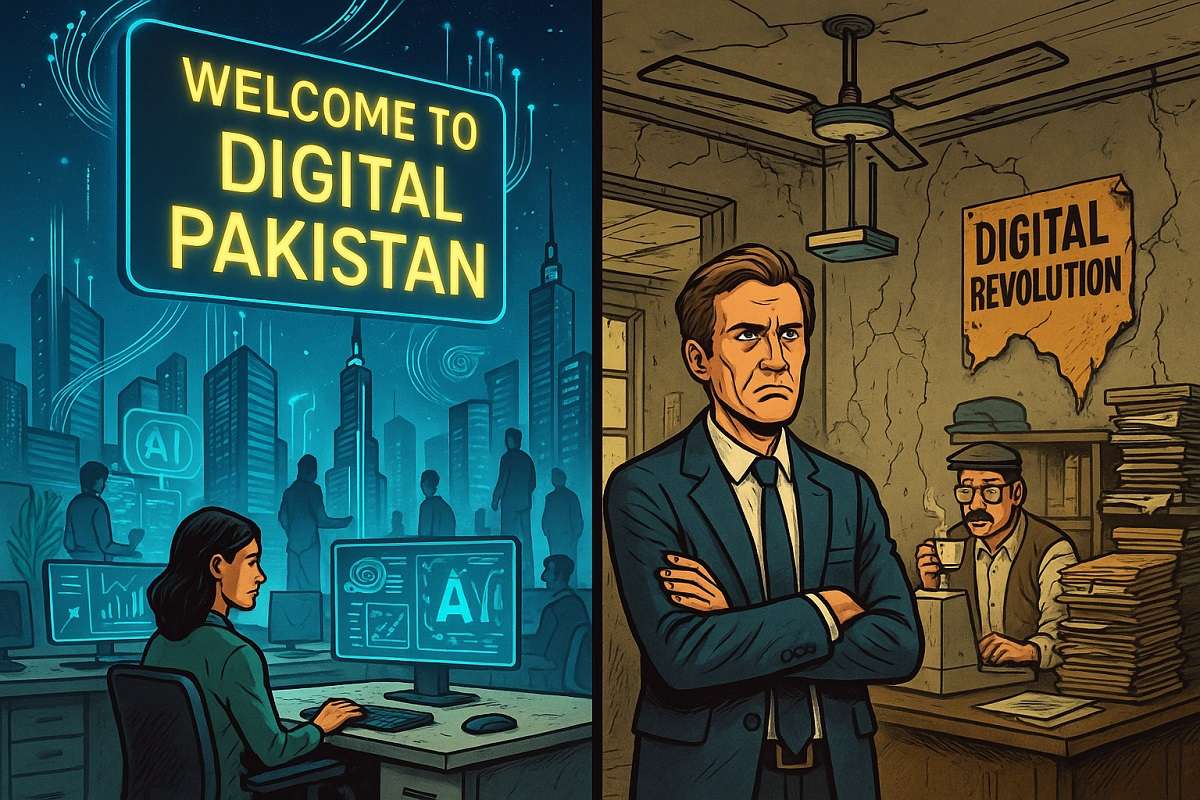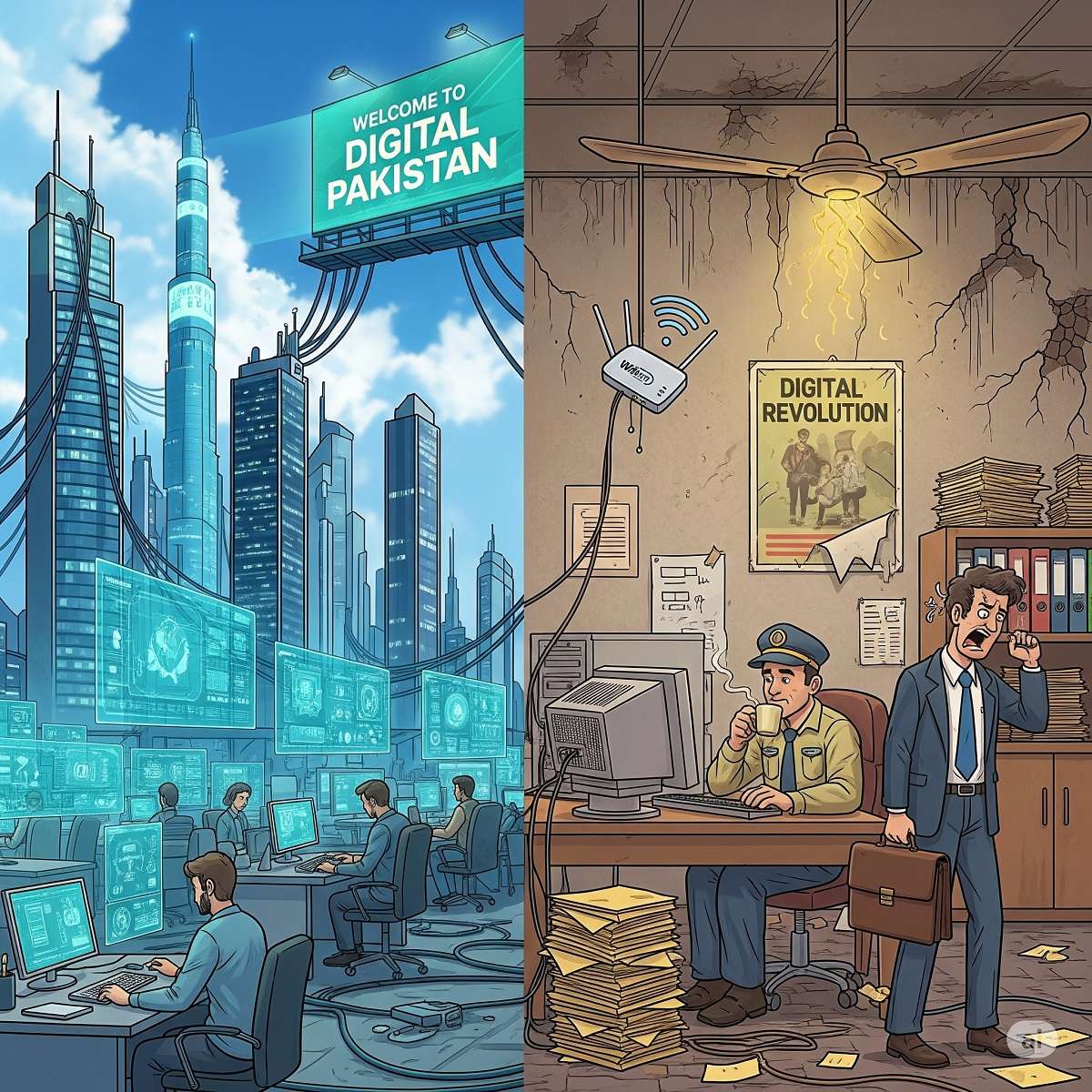- 21 July 2025
- No Comment
- 517
Unplugging the Reality of Digital Pakistan

When Henry landed at Islamabad International Airport, he wasn’t wearing a safari hat or searching for chai (tea). He was on a mission. A sharp-suited American investor with a passion for tech, Henry had chosen Pakistan as the launchpad for his latest venture: a state-of-the-art AI infrastructure startup that promised to “digitize South Asia from the cloud down.”
He had read the reports, seen the TED Talks, even watched a few overly optimistic YouTube vlogs by foreign influencers romanticizing the land of mangoes and mountains. With the bold words “Digital Pakistan” echoing in his mind like a TEDx mantra, he stepped off the plane, ambitious, idealistic, and fatally unprepared.
The first sign that Henry might have misunderstood the assignment came at the SECP office. His application to register a company was greeted not with enthusiasm but with suspicion, as if he’d wandered in asking to open a uranium plant.
“You are foreigner? Very good,” the officer nodded politely, sipping his chai (tea). “But first, Security Clearance, Sir!”
A form thicker than “War and Peace” was handed over, requiring Henry to list every country he had ever visited, his great-aunt’s property details, and whether his grandmother had ever subscribed to any suspicious magazines during the Cold War. “How long will this take?” Henry asked. “Three to six months, maybe more. Depends on… tea situation.” That was the first of many cups he would drink, each one sugarier and more bureaucratically bitter than the last.
While the paperwork brewed, Henry explored the scenic north, reread novels, and even briefly considered abandoning AI to open a chai café in Hunza. But fate, or a delayed approval letter, brought him back to Islamabad, where the next surprise awaited.
Now, to be officially accepted as a foreign director, Henry had to disclose his global assets.
“Everything?” he asked.
“Yes sir,” the SECP officer said cheerfully, “Your bank accounts, properties, stocks, retirement funds, and any income from your cousin’s Etsy store. Total transparency.
We’re very digital now.” Henry blinked. “US doesn’t even ask me that much when I file taxes.” “But this is Pakistan,” the officer smiled, passing him another form and a cup of chai, “Here, we digitise your soul first.”
With registration finally crawling forward, Henry moved to banking. The bank branch manager at PCB looked like he’d just seen someone attempt to open a spaceship account.
“Sir, you want to open corporate account for foreign entity?” the manager asked. “Honestly, it’s first time for me. We will try. Inshallah.” Four phone calls, three confused email threads, and one emotional visit to the head office later, Henry had a basic bank account. But wait, there’s more.
To bring investment into the country, he needed a foreign exchange account, which, according to the very serious-sounding circulars, required another round of approvals, timelines, and a divine miracle. “Sir, three to four months minimum,” the officer advised. “Allah karam kare.”

Henry, not one to give up easily, created an Excel sheet titled: “Departments to Survive”. It included a colorful list: FBR, PSEB, STZA, EOBI, PESSI, Excise, and the wonderfully mysterious “Workers Welfare Board.”
Each department had its own set of documents, its own version of chai, and its own preferred pen ink. After five months, 21 official letters, 178 cups of tea, and more biometric scans than a spy thriller, Henry had finally checked all boxes. Somewhere, a government server creaked in celebration.
But the real punch came from the Karachi port. Henry’s company had imported $10 million worth of AI hardware, servers, cooling systems, ultra-fast drives, the kind of stuff that could power an entire region’s digital ecosystem. Customs took one look at it and said, “Very good. Now pay 36% duty.” “But this is technology! Essential for growth!”
Henry protested. The officer shrugged. “We have duty for everything. Even books. It’s policy.” Henry did the math. Two extra years of losses just to recover the customs cost.
Still undeterred (or possibly just numb), Henry hired a brilliant Pakistani CTO, Mr. Nawaz Shareef, at an impressive salary of 1 million rupees a month. But it turned out that with taxes, social contributions, and “miscellaneous deductions,” the actual cost was closer to 1.5 million. When Mr. Shareef posted about it in his tech WhatsApp group “BuildForPakistan,” it triggered a debate longer than a Marvel movie. “Why are we paying this much to a system that gives us nothing back?” someone wrote. “Because hope is a dangerous thing,” replied another. The message got 108 likes and five crying emojis.
Then came the FBR letter, corporate income tax: 29%. “Wait a minute,” Henry muttered, “US taxes me less than this!” Before he could even call his accountant, a surprise “survey visit” from the tax department landed him in a police van and then in a holding cell, alongside a rat he later named Asif. The reason? “Suspicion.”
Apparently, new laws allowed tax officials to detain CEOs during audits. Two million rupees and one tetanus shot later, Henry was released.
Five years went by. The company was finally profitable. Head office in California sent a cheery email: “Congrats! Now send us some of that sweet ROI!” Back to the bank Henry went, now older, wiser, and mildly twitchy.
“You want to send dollars outside Pakistan?” the teller asked, as if he had requested to teleport gold to Mars. “Sir, we don’t usually do that. Wait for instructions.”
A week later, a call came from the bank. “Sir, your transaction was blocked. State Bank Deputy Director marked it as ‘Anomaly Detected.’ No explanation followed. Just a cold void where international business dreams used to be.
That evening, Henry received another call, from California. “We’re shutting down the Pakistan operation,” the voice said. “You’re fired.” He laughed. Not in surprise, but relief.
Henry woke up, drenched in sweat, in a luxury hotel in Dubai. It had all been a dream, or had it? Surely, no country that wants foreign investment would create a maze of delays, suspicion, and outdated policies. Surely, not in 2025, in an era of AI and global cloud revolutions. Right?
But this story, though fictional, isn’t far from the truth.
It is pieced together from real frustrations, shared in hushed startup circles, in complaint-laden LinkedIn posts, and over chai cups in co-working spaces. Faces change. The pain remains the same. For all the marketing slogans and sleek presentations about “Digital Pakistan,” the reality on the ground tells a slower, more complicated story, one where dreams are coded in optimism but executed in forms, folders, and infinite follow-ups.
Because if we truly want a Digital Pakistan, it will take more than hashtags. It will take systems that work, departments that talk, and a government that understands that the world won’t wait for us to reboot. Otherwise, the cloud will float to Dubai, the AI will train in California, and Pakistan’s digital dream will remain just that, a dream, occasionally interrupted by the smell of sweet chai and the echo of “Anomaly detected.”




